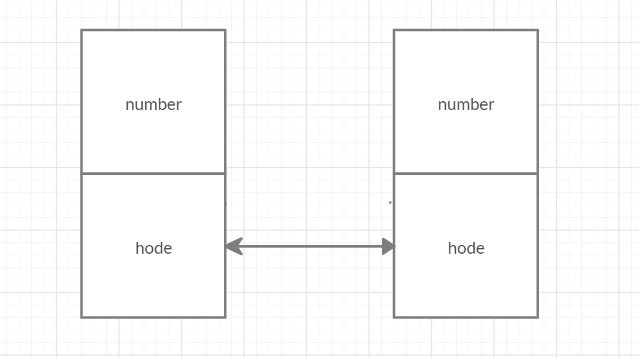链表基本结构和一般链表基本结构比较
一般的数据链表结构定义如下,链表的基本增删改减功能都依赖struct type, 对于种类型的链表,都得实现一遍功能。
struct type{
int number;
struct type* next;
}
Linux下的链表结构只带指针域,基本的增删改减功能都通过struct list_head来完成,而不涉及链表结构数据域,所以重用性较高。
linux下链表结构:
struct list_head {
struct list_head *next, *prev;
};
struct type {
int number;
struct list_head *hnode;
}
链表初始化
LIST_HEAD(name) 定义声明 name 链表, 链表的 next, pre 都指向自身。
INIT_LIST_HEAD() 初始一个链表, next, pre域都执行自身。
#define LIST_HEAD_INIT(name) { &(name), &(name) }
#define LIST_HEAD(name) \
struct list_head name = LIST_HEAD_INIT(name)
static __inline void INIT_LIST_HEAD(struct list_head *list)
{
list->next = list;
list->prev = list;
}
链表获取 entry
offsetof(TYPE, MEMER) 求出MEMER在TYPE类型中的偏移量。
container_of(ptr, type, member)求ptr所在结构体的首地址。
#ifndef offsetof
#define offsetof(TYPE, MEMBER) ((size_t) &((TYPE *)0)->MEMBER)
#endif
#ifndef container_of
#define container_of(ptr, type, member) \
((type *)((char *)(ptr) - offsetof(type, member)))
#endif
链表遍历
pos = list_entry((head)->next, typeof(*pos), member) 链表头部的第一个节点入口地址 , pos = list_entry(pos->member.next, typeof(*pos), member) 依次遍历入口地址。
list_for_each_entry_safe(pos, n, head, member) 参数 n用于 提前保存next指针,使删除节点安全。
#define list_for_each_entry(pos, head, member) \
for (pos = list_entry((head)->next, typeof(*pos), member); \
&pos->member != (head); \
pos = list_entry(pos->member.next, typeof(*pos), member))
#define list_entry(ptr, type, member) \
container_of(ptr, type, member)
#define list_for_each_entry_safe(pos, n, head, member) \
for (pos = list_entry((head)->next, typeof(*pos), member), \
n = list_entry(pos->member.next, typeof(*pos), member); \
&pos->member != (head); \
pos = n, n = list_entry(n->member.next, typeof(*n), member))
链表插入
list_add()将 new 节点加入head之后。
static __inline void list_add(struct list_head *node, struct list_head *head)
{
__list_add(node, head, head->next);
}
static inline void __list_add(struct list_head *new,
struct list_head *prev,
struct list_head *next)
{
next->prev = new;
new->next = next;
new->prev = prev;
prev->next = new;
}
链表删除
list_del(struct list_head *entry) 删除 entry节点, 并将 next, prev指针置空。
static __inline void list_del(struct list_head *entry)
{
__list_del(entry->prev, entry->next);
entry->next = (struct list_head *)LIST_POISON1;
entry->prev = (struct list_head *)LIST_POISON2;
}
static __inline void __list_del(struct list_head * prev, struct list_head * next)
{
next->prev = prev;
prev->next = next;
}
示例代码
#include <time.h>
#include <string.h>
#include <stdlib.h>
#include <stdio.h>
#include "list.h"
#define HASH_MASK ((1 << 8) - 1)
struct list_head user_slots[HASH_MASK + 1];
struct user {
struct list_head hnode;
char mac[18];
time_t active_time;
time_t magic_time;
};
static void hash_init() {
int i =0;
for(; i<HASH_MASK; i++) {
INIT_LIST_HEAD(&user_slots[i]);
}
}
static unsigned int hash_crc(const void *p, int len) {
int i;
unsigned int hash = 0;
const unsigned char *addr = (const unsigned char*)p;
for (i = 0; i < len; i++)
hash += hash * 33 + addr[i];
return hash;
}
static void set_user(int add, struct user *user , struct list_head *macslot, char* mac, time_t now) {
if (!add) {
list_del(&user->hnode);
free(user);
return;
}
if (strcmp(user->mac, mac)) {
strcpy(user->mac, mac);
}
user->active_time = now;
list_add(&user->hnode, macslot);
}
struct user *user_insert(char *mac) {
struct user *user = NULL, *pos = NULL;
struct list_head *user_slot = &user_slots[hash_crc(mac, strlen(mac)) & HASH_MASK];
time_t now = time(NULL);
list_for_each_entry_safe(user, pos, user_slot, hnode) {
if (!strcmp(mac, user->mac)) {
user->active_time = now;
return user;
}
}
user = (struct user*)malloc(sizeof(struct user));
if (!user) {
return NULL;
}
memset(user, 0, sizeof(struct user));
set_user(1, user, user_slot, mac, now);
return user;
}
static void user_delete(char *mac) {
struct user *user = NULL, *pos = NULL;
time_t now = time(NULL);
struct list_head *user_slot = &user_slots[hash_crc(mac, strlen(mac)) & HASH_MASK];
list_for_each_entry_safe(user, pos, user_slot, hnode) {
if (!strcmp(mac, user->mac)) {
set_user(0, user, user_slot, mac, now);
return;
}
}
}
struct user *user_lookup(const char *mac) {
struct user *user = NULL, *pos = NULL;
struct list_head *user_slot = &user_slots[hash_crc(mac, strlen(mac)) & HASH_MASK];
list_for_each_entry_safe(user,pos, user_slot, hnode) {
if ( !strcmp(mac, user->mac)) {
return user;
}
}
return NULL;
}
static void list_print() {
int i = 0;
struct user *user = NULL, *pos = NULL;
struct list_head *user_slot = NULL;
for(i=0; i<HASH_MASK; i++) {
user_slot = &user_slots[i];
list_for_each_entry_safe(user, pos, user_slot, hnode) {
printf("user->mac = %s, user->actiev_time = %lu\n", user->mac, user->active_time);
}
}
printf("\n");
}
int main(){
hash_init();
user_insert("EE:EE:FF:FF:EF");
user_insert("12:34:56:78:98");
user_insert("FF:FF:FF:FF:FF");
user_insert("E3:E3:E3:E3:E4");
list_print();
user_delete("E3:E3:E3:E3:E4");
user_delete("E3:E3:E3:E3:E4");
user_insert("EF:88:88:88:88");
list_print();
return 0;
}
